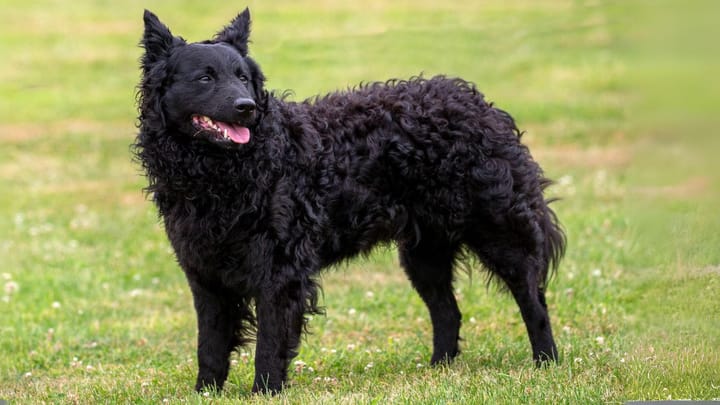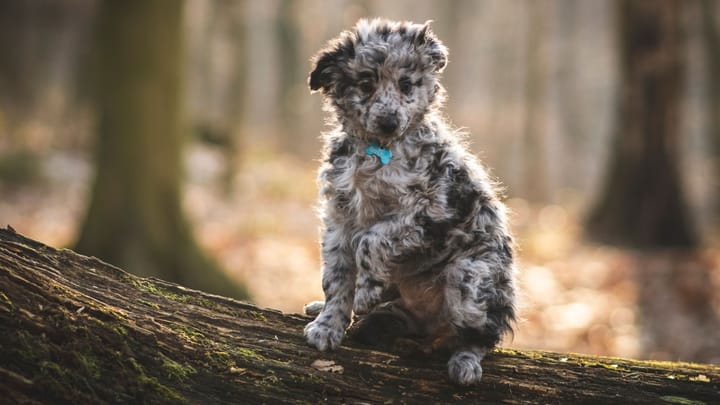Mudi


The Mudi is a Hungarian dog which is extremely rare in the UK. It’s a gorgeous breed, though - affectionate, loyal, energetic, playful and unapologetically protective of its family. They were bred as herding dogs and are still commonly used on Hungarian farms today. Due to their herding background, the Mudi is a very vocal breed and excessive barking is a common problem. However, other than that, this is a highly intelligent, loving breed who makes a lovely, trustworthy and obedient family pet.
|
Life expectancy |
The Mudi has a life expectancy of between 12 and 14 years |
|
Temperament |
|
|
Size |
Medium
|
|
Adult size |
Female
Between 15 and 17 in
Male
Between 16 and 19 in
|
|
Adult weight |
Female
Between 18 and 24 lb
Male
Between 24 and 29 lb
|
|
Coat colour
The Mudi coat is most commonly black, but may occasionally be brown, merle, fawn, white or grey. |
White Brown Blue Black |
|
Type of coat
The Mudi’s coat can be straight and smooth, or wavy or curly. It is a thick, dense coat which is known for its beautiful shine. The coat is slightly shorter on the face and legs. |
Short Wavy |
|
Eye colour
This breed has expressive dark eyes. |
Brown
Odd-eyed
|
The hair of the Mudi is richer in pigment than that of other breeds. The hairless surfaces are black, the pads and the nails slate gray.
More details about the Mudi
Mudi: Origins and history
The Mudi originates from Hungary. It’s believed they’ve existed since the 1800s, though the first official ‘breed’ was listed in 1936. They’re relatively rare and were at threat of extinction some years ago, but have been repopulated by a dedicated group of breeders.
Physical characteristics of the Mudi
This is a small-medium sized dog with a long, straight back and an athletic, sturdy overall appearance. In fact, their body is similar to that of a Border Collie. The Mudi has a wedge-like head with ears which stand upright and alert, a pointy black nose and a strong jaw. The eyes are oval and dark, giving them an undeniably expressive, alert look. Interestingly, Mudi puppies are born with no tail.
FCI classification of the Mudi
-
Group 1 - Sheepdogs and Cattledogs (except Swiss Cattledogs)
-
Section 1 : Sheepdogs
Mudi: Characteristics
Mudi: Behaviour
Training a Mudi
The Mudi is eager to please and enjoys taking on jobs and completing tasks - yep, they love training! With plenty of rewards and positive reinforcement, this breed is easily trainable. However, it’s essential to start young as once they’re older and more independent, they could become a little stubborn.
Mudi: Lifestyle
Breed compatibility Mudi
Mudi: Purchase price
They’re pretty hard to come across in the UK. We do not have enough data to set an average price, but you can expect to pay upwards of £1000 for a well-bred dog. Looking after a dog of this size typically costs between £50 to £80 a month, including food, medical/insurance, and incidental expenses.
Mudi: Grooming
The Mudi’s coat naturally sheds dirt, meaning regular baths aren’t necessary. A few times a year (and possibly even less) should suffice - but do remember to rinse them with fresh water after swimming in salt water. It’s best to brush their coat weekly to keep it shiny by spreading oils, as well as minimizing mess from shedding. However, it doesn’t need trimming - yep, easy peasy!
Mudi: Health
Overall, the Mudi is a healthy bread, with an average life expectancy of 13 years.
The Mudi is a relatively strong, tough dog - after all, they’re first and foremost a working dog. However, they’re not the strongest pooch in the book - they’re very gentle, love a cuddle and shouldn’t live outdoors.
The Mudi is fine in high temperatures.
Their thick, curly coats are fairly weather resistant, meaning the Mudi copes better in cold weather than hot. However, they should always be given a warm and dry place to shelter.
In general, obesity isn’t a problem in this breed. However, senior Mudis may gain weight in the abdominal region - in this case, you may need to adjust their calorie intake.
- Epilepsy
- Hip dysplasia
- Cataracts
- Elbow dysplasia
- Patellar Luxation
Do you want a Mudi dog ?
1 comment
-
1 comment out of 1
Are you sure you want to delete the comment?








